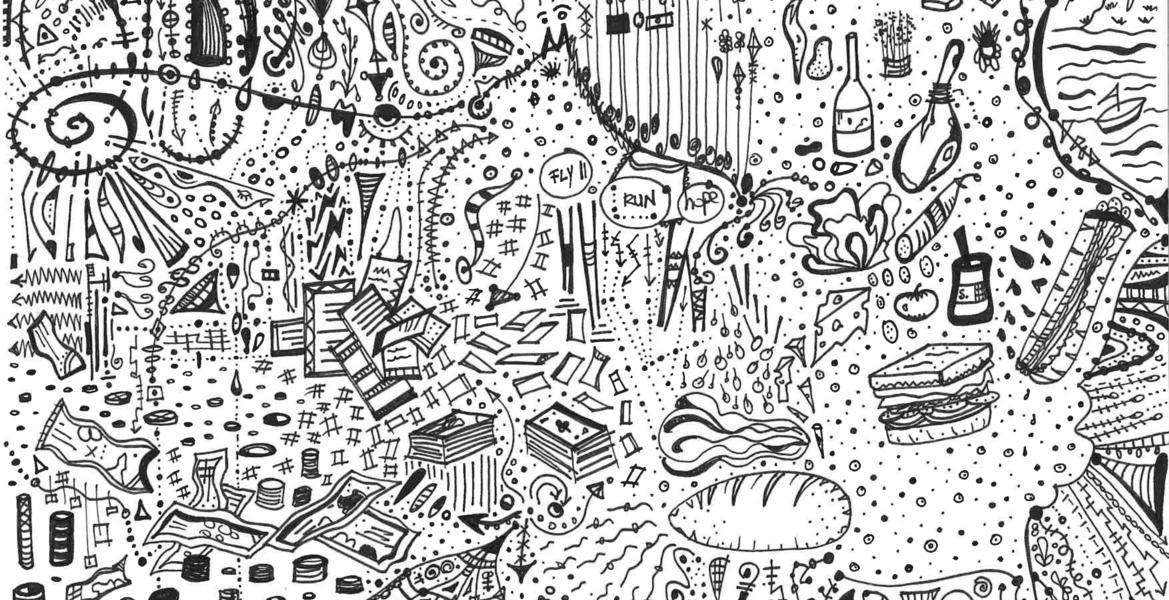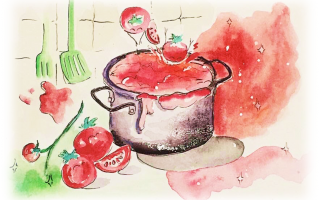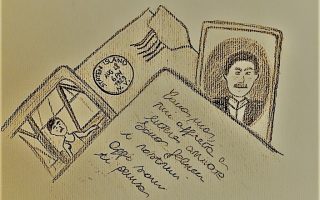di ANNIE LANZILLOTTO
The Bronx, New York, 1968
“War is full of smoke.” Lanzi’s laugh is a single gruff exhale. Cigarette smoke gushes out his nostrils and up into the light over the table. His eyebrows are thick and black and move up and down one at a time fast as pinball flippers. His left eyebrow is interrupted by a hanging ball of skin. I shiver with laughter and duck under the thick stream of smoke. “You call this smoke, Daddy, you don’t even know what smoke is.” My father calls me Daddy. He belongs to me. He lays the cigarette down on a plate. The smoke rises in one white rope that curls around the wagon wheel chandelier and spreads out across the tin ceiling patterned like ten thousand pizzelle. We sit together most nights just me and him at the maple table. My brothers and sister are old enough to be out. Rosemarie works at Macy’s. CarKey and Anth’ny run the streets. My father says with boys, you don’t need to know where they are all the time. I want to be a boy. I feel like a boy most of the time, but I’m not as free as real boys. I put my feet up on the table, eat with my hands, get my clothes filthy, lean back on the hind legs of the chair. When the women do the dishes, I sit with the men at the table. I feel most free when I’m alone with my father. He takes the time to teach me things. He draws a circle around the name of a racehorse and underlines the jockey’s name. He draws an arrow at the horse and writes “sloppy at the start,” with a pencil the size of his cigarette butt. He sharpens the tip with a steak knife, the wood and lead shavings mix with the ashes. I cough. He spanks the curls of smoke that hang between us. We study the names of horses and jockeys. He points to a column of numbers and shows me how many races each horse has run on sloppy track dirt. Other columns list how much money the thoroughbred won this year, how many wins the jockey has, what’s the horse’s lifetime purse. He tests me on the different answers. On my father’s knee I learn the words: furlong, flank, platoon, kamikaze.
“Cigarettes are staples,” he says, “the military issues cigarettes in K-Rations. Two Chesterfields, a slab of cheese and a couple of crackers. That’s all the body needs. As long as you eat with guys you trust.”
This is the Bronx. You learn your lessons early.
I learn to count with a deck of cards. “Ace deuce tree fo’ five six seven eight nine ten Jack Queen King.” He calls and I repeat. “The Ace can come in high or low.” He pushes aside his horse racing binders, takes out two decks of cards and begins to shuffle. I run to get my jar full of coins from under the bed and dollars from my sock drawer and dump it all on the maple table. Lanzi shuffles the cards one hand to the other then makes the fluttering bridge between his two hands. My hands aren’t big enough to do that. Lanzi’s hands are massive. He crushes a walnut between the knuckles of his fore and middle fingers. Knuckle skin, underneath his nails, and the lines of his palms are etched in black, from oil stains built up over the years; his destiny is indelible. He smacks the deck onto the table. Blue streams of smoke gush from his nostrils.
“Cut, Daddy,” he says.
I grab half and smack it down. He puts the stacks together.
“We’ll bury one,” he says, and takes the top card, shows its face, and puts it on the bottom. It’s the deuce of diamonds. Lanzi raises one eyebrow at the steepest angle an eyebrow can go. He licks his thumb and flicks cards down, one at me, one to him, repeatedly. I fan my cards out in my hand. They are too many to hold. I put the fan of cards down in front of me.
“So Daddy, you’re all Gung Ho ‘bout Kindy-garten huh? Good. Good. Just remember, listen to me, keep your eye on the pavement and your mouth shut in the schoolyard. Be a listener not a talker. The guy who knows the most is always saying the least. Remember that. You, are your own business. Everyone else is an intruder.”
He looks into the smoke he blows. The veil rises over me. I crease my dollar bills and make them face the same direction. He picks a card and throws one down.
“Walk directly there, one foot in front of the other. If someone looks at you in the street, you say nuttin’ you keep walking. You must constantly be aware of who’s behind you. If someone smiles at you, they want something. Stay away. Stupid things don’t happen to those aware. Look both ways you understand before you cross even a one way street. One way street, one way, who says the one way? When you sit down in class, make sure you don’t sit near the windows. A bullet coming in through the bottom of the window will cause the greatest shrapnel effect. You wanna duck below the window. You wanna cover your head. You never know. You hit the floor. Keep ya’ mouth shut and if anybody aggravates you, you get rid of ‘em.”
Old dollar bills smell to me like fire. My father hands me his magnifying glass and I pass it over the details in the bills the way he taught me, the signature of the Secretary of Treasury, the shadow on the head of the number one, the eye over the pyramid, the code of numbers that start with a capital letter to trace where the bill was born. Philadelphia. Denver. I pick a card and fit it into my hand.
“Don’t pull your cards up so high. What if I’m in cahootz with a guy standing behind you? What if there’s a mirror there? Hah? Be aware of what’s behind you. Be aware of who’s behind you.”
Pennies I stack into towers of ten. ‘Wheat chaff’ pennies, I put aside to save in my mechanical bank. I put the penny in the hunter’s rifle, pull the crank and he shoots it into a treestump. Stacks of pennies I put into towers, towers I put into rows, rows into platoons.
“Throw down,” my father says.
The King of Clubs looks like my father. He has a curl at the bottom of his hair and swings a club at anybody he wants.
“I knock,” he says, and lays his cards down. My father gets all the points in my hand. “Loser deals.”
Lanzi pushes all the cards in front of me. I try to shuffle them but they fall, some face up. That’s a no-no. I turn them all over and begin again. There’s one woman in a deck of cards and three men, the Jack, the King, and the Joker. The Jack of Hearts looks like my brother CarKey, blonde with tender blue eyes. Anth’ny is the Joker. He laughs for no reason and I never know what to expect from him. Things disappear from the house. But he never means any harm and he tries to be entertaining. The Jokers we put on the side. They watch us play. Rosemarie and my mother Rachel both look like the Queen of Spades, blue eyes, a serious look. They hold scepters like long wooden spoons. The King of Hearts holds a knife behind his head, and I can’t imagine why.
I flick a standing quarter. It flies across the maple table. I practice flicking my finger in the air.
“Concentrate Daddy. Are we playing Pinochle or spinning coins?”
“I am concentrating. Just show me once.”
I release my middle finger onto the edge of a standing quarter held up by the pulp of my left hand’s forefinger. The coin falls.
“Try again Daddy, you gotta learn to have the right touch.”
“My hands are small.”
“It doesn’t matter. You just gotta flick it the edge. You’re hitting too much of the coin.”
He gets five quarters spinning at one time. Ghosts of my father’s spinning coins whirl in the maple table’s shine. Mine fall flat or fly into the curtains.
“Curl the middle finger like this see, into the pad of the thumb. Hold it tense, the whole top of the finger, so when the thumb lets go, the finger flies. And if you find quarters that are solid silver, they are older than you. Hold onto ‘em.”
“Whaddya’mean?”
“Look at the side-wall ridges Daddy. See the split band of copper and nickel? See if you can find one without that. Just silver. Those are the old ones.”
The maple table is our rink. My fingertips blacken from playing with money and smell like copper. Later I will go into the bathroom and dip my hands in my father’s can of grease solvent that’s up on the toilet. I will rub the gritty solvent into my hands. I will look in the bathroom mirror and I’ll say, “They don’t make a soap can take the grease off these here hands. This is the history of New York. Who do you think fixed all the oil burners in all these here buildings? Who do you think brought all the ice up all the stairs?”
We play until eleven p.m., then we put the money and cards away. My mother Rachel walks over with her lemon oil rag, tells me to sit the chair up straight on four legs, and gives the table a rubdown. The maple table stands under the light like a racehorse in a stall. My father pushes down on the table to get up from his chair, and the table grunts.
My mother says something.
And he says, “Shut up, you.”
Rachel pushes the rag in circles with her bare strong arm, flips the rag, refolds it, and pushes circles to a slick shine. I kiss it and I can see my lip prints in the shine. The table’s legs bulge into shapely calves. Four strong legs she strokes up and down.
I follow Lanzi to the living room where we watch the news. The First Marine Division is in Vietnam and that’s what he wants to hear about. My brothers are teenagers and the draft is coming up. At midnight Lanzi and me make sangwiches, a piling of salami, provolone, ham, lettuce, tomato, mustard, on Italian bread. We watch Alfred Hitchcock Presents. We fill cereal bowls with ice cream. We watch The Twilight Zone. The tension in my body matches the tension in the stories. One episode replays in my mind for years. A prop plane with red markings on its wings crash lands into a house, rips through the living room walls and lands next to the couch. The woman in the house has a past connection with the pilot. He’s been lost since the war. She has waited. This is the episode that won’t leave my mind. The lost soldier crashes into the living room and brings his war right to the couch. I can see my father as a young marine, my father circles overhead, my father can demolish the plasterboard that surrounds our rooms at any moment now. The walls can split any time now. I face the television set. I run my fingers in the corrugated patterned terrain of our deep blue-green living room rug. I see ocean waves in our rug. I see the Pacific Ocean. I see my father on the islands of Okinawa and Guadalcanal in that sea blue. I see the First Marine Division cut the island of Okinawa in half. I see the Sixth Marine Division to the north. The army to the south. I say what my father would say:
“We landed on Blue Beach from the U.S.S. Maggoffin — we called it My Coffin.” The only light on is of the televison and the tail lights of the Hess oil truck Lanzi bought me. Grey plastic dinosaurs he got from ESSO Fuel Oil Company stand in the truck’s way. My truck drives over the sea, where the dinosaurs walk out of the water.
I lay down in the water.
My father carries me to sleep, sits on a chair next to my bed, and tells me story.
“Once upon a time there was a white horse, and on the white horse was a princess named Annie. Princess Annie rode the white horse up a mountain. On the way up the mountain they met a goat. The goat said, “Hey, where you goin’?” And Princess Annie said, “To the top of the mountain.” And the goat said, “Can I come too?” “Sure,” Princess Annie said, and the white horse and goat went up the mountain. And on their way up the mountain they met a lion, and the lion said, “Where you going?” And Princess Annie said, “To the top of the mountain.” And the lion said, “Can I come too?” “Sure,” said Princess Annie, and the white horse and the goat and the lion went up the mountain. And on their way up the mountain they met a rabbit. And the rabbit said, “Where are you going?” And Princess Annie said, “To the top of the mountain.” And the rabbit said, “Can I come too?” “Sure,” Princess Annie said, and the white horse and the goat and the lion and the rabbit went up the mountain. And on their way up the mountain they met a bird. And the birdie said, “Hey where are you going?”
My father drifts off into silence and stares off into the dark. “We went up the left flank of the hill. There was an explosion out the roots of a tree. I thought I got him. But he got you. I said ‘No Hewitt. No.’ There was nothin’ I could do. But I got him. I got the ear. I got the gold teeth. For you, I got ‘em.”
I elevate out of bed and fly through the living room and narrow hall outside my brothers’ room. Soupy Sales flies behind me through the hall that leads to the kitchen. He chases me in between double doors that separate the kitchen from the rest of the house, a screen door and a glass door. Soupy Sales has a big smile. He wears a bowtie, His black and white houndstooth suit makes me dizzy. I shut him out with the doors. He flies right through them and chases me into the kitchen. I fly to the left, down the spiral stairs into the basement. The basement is pitch black. I am trapped. I fall into the black abyss, I fall. I clutch the mattress as if it falls with me, and I fall back into bed.
Chapter One from the book: “L is for Lion: an italian bronx butch freedom memoir”, SUNY Press, Series in Italian American Culture Excelsior Editions
On the cover: illustration by Barbara Di Bernardo




